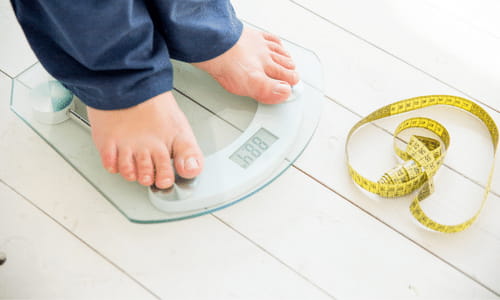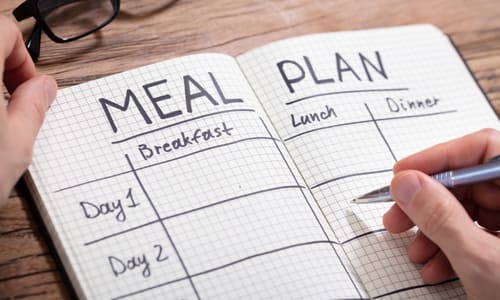Top 7 Diet for Weight Gain Tips
“Top 7 Diet for Weight Gain Tips” was written by Lauren Whitman, RDN & edited/reviewed by Aly Bouzek, MS, RDN.
There’s a lot of information out there about how to lose weight, but what if you want to gain weight? You may be underweight and need to get to a higher body weight, or you may be maintaining your weight and struggling to gain more weight.
Thinking of your weight gain goals: there are lots of healthy, easy, quick things you can change in your diet to gain weight. And we’ve shared them all below. Let’s check them out together!
How to Gain Weight in a Healthy Way

With weight gain, you will want to observe your current eating habits and diet – are you currently losing weight or maintaining your weight?
(Maintaining your weight means that it stays around the same number consistently).
In general, you only want to gain 1-2 pounds at MOST per week. Gaining more than 2 pounds per week may not be healthy or sustainable.
Calculating your Calorie Needs
First, you want to calculate your maintenance calorie level. This is the amount of calories you need each day to maintain your current weight.
You can calculate this by taking your age, height, weight, gender, and activity level and entering them into the following 2 equations: (1)
Females: (10 x your weight in kilograms) + (6.25 x your height in centimeters) – (5 x your age in years) – 161
Males: (10 x your weight in kilograms) + (6.25 x your height in centimeters) – (5 x your age in years) + 5
Helpful tips:
- To get your weight in kilograms (kg), simply divide your weight in pounds by 2.2. Or check out this conversion link if you don’t have a calculator handy.
- To get your height in centimeters (cm), simply multiply your height in inches by 2.54. Or check out this conversion link if you don’t have a calculator handy.
Calculating your Activity Level
Then, multiple the number from the above equation by your activity level
- Sedentary x 1.2
- Sedentary means that you spend the majority of your day sitting
- Lightly active x 1.375
- Lightly active includes light daily exercise – similar to relaxed walking for about 30 minutes a day about 4 times a week
- Moderately active x 1.55
- Moderately active means that your daily exercise is more than 30 minutes for 2-3 hours a week or you do more intense exercise for a shorter period of time
- Very active x 1.9
- Very active includes doing heavy physical activity or training for competition sports more than 3 times a week
Check out this link if you’re not sure which activity level is right for you.
Examples!
Let’s do some examples together!
Feel free to do the math by hand, but if you’d like some help, then check out this handy link where you can simply input the numbers below to get calorie needs per day.
Please note that your final total may differ from that listed below depending on how you manually round your numbers.
Example for 100 pound (lb) female who is 50 years old, 5’6”, and moderately active:
- 100 lb / 2.2 = 45.5 kg
- 5’6” = 66 in x 2.54 = 168 cm
- (10 x 45.5 kg) + (6.25 x 168 cm) – (5 x 50 yrs old) – 161 = 1094
- 1094 x 1.55 moderately active = 1,696 calories per day are needed to maintain her 100 lb weight
Example for 130 pound (lb) male who is 50 years old, 5’9”, and sedentary:
- 130 lb / 2.2 = 59 kg
- 5’9” = 69 in x 2.54 = 175 cm
- (10 x 59 kg) + (6.25 x 175 cm) – (5 x 50 yrs old) + 5 = 1439
- 1439 x 1.2 sedentary = 1,727 calories per day are needed to maintain his 130 lb weight
How Many Added Calories for Weight Gain?
Now that you know about how many calories you need to eat each day to maintain your weight, you will want to aim to eat more than that amount of calories every day.
In general, gaining 0.5 – 1 pound per week is a safe, realistic goal for weight gain.
If your goal is gaining half a pound each week, then you’ll want to eat around 250 more calories every day. If your goal is gaining 1 pound per week, then you’ll want to eat about 500 more calories every day.
Looking back to our examples above:
The female would need to eat 1946 calories per day to gain half a pound a week (1696 + 250 = 1946).
She would need to eat 2,196 calories per day to gain a pound a week (1696 + 500 = 2196).
The male would need to eat 1,977 calories per day to gain half a pound a week (1727 + 250 = 1977).
He would need to eat 2,227 calories per day to gain a pound a week (1727 + 500 = 2227).
Please note that you don’t need to count calories to be successful with your weight gain!
If you are interested in a meal plan for weight gain, then we recommend talking to a registered dietitian or a geriatric dietitian who can give you expert nutrition advice that is personalized just for you.
Top 7 Tips for Safe & Healthy Way Weight Gain
As we mentioned above, counting calories or macronutrients is not necessary in order to be successful in gaining weight. Here are our top 7 tips for gaining weight in a safe and healthy way!
Diet for Weight Gain Tip #1: Analyze What You’re Currently Eating

It’s a good idea to sit down and examine what you are currently eating.
What foods do you eat often? What foods do you enjoy?
Do you make time to eat meals and plan them ahead of time, or do you eat on the go?
You don’t need to make drastic changes in order to reach your weight gain goals.
There are small changes you can make to what you are currently doing that will help you gain weight.
Be sure to continue eating the foods you do like! Weight gain is a slow and steady process, so making small and realistic changes is so important for your journey.
Diet for Weight Gain Tip #2: Swap for Nutrient-dense Foods
If you’re looking to mix up your current meals, then consider adding or replacing foods with ones that are more nutrient-dense.
The term nutrient-dense refers to foods that are high in healthy nutrients like vitamins, minerals, healthy fats, carbohydrates, and protein.
There’s a good chance that you’re already eating foods that are nutrient-dense, but you may be able to swap some other foods in your diet for a more nutrient-dense version.
For example, do you drink coffee every morning? Try switching your coffee creamer to something like whole milk or half and half. These two have more calories and fat than traditional creamer and can help increase your calories.
Do you drink soda or juice? Try switching to smoothies that are made with protein and healthy fats. We have lots of High Calorie Smoothie recipes and Weight Gain Smoothie recipes for you to try!
Here is a roundup of a few of our quick, easy diet swap tips for weight gain:
- Choose full fat salad dressing instead of low-fat/fat-free versions
- Choose full-fat Greek yogurt instead of low-fat yogurt
- Choose full-fat cheese and cottage cheese instead of low-fat versions
- Opt for guacamole over salsa – guacamole is made with a base of avocados (super nutrient-dense and have healthy fats) vs salsa (which has a base of tomatoes)

As you can see, a good rule of thumb for weight gain is to look for full fat versions of your favorites. These will pack additional nutrients and calories which are great for your diet for weight gain.
Still looking for more food swap ideas? We’ve got even more high calorie food ideas for you here.
Diet for Weight Gain Tip #3: Add Healthy Ingredients
Looking for ways to sneak more nutrients in your diet for weight gain? Here’s your chance to get creative in the kitchen!
There are plenty of ways to enhance your go-to meals and snacks, which can also help you achieve your weight gain goals.
Pick out some nutrient dense foods to add to your diet, like whole grains, starchy vegetables, dried fruits, nuts, and full-fat dairy products.
You can:

- Add olive oil to your favorite salads and dips (like hummus)
- Add cheese to your favorite vegetables (a fan favorite is melty cheese on broccoli)
- Add nuts to your salads and cereal
- Add dried fruit to your salads, yogurt, cereal, and snacks
- Add avocado to sandwiches and salads
- Pair fruit (like apple slices or bananas) with peanut butter
- Add dried fruits and nuts to your snack collection
Diet for Weight Gain Tip #4: Eat Meals and Snacks More Frequently

How much do you eat, and how often are you eating?
If you are eating 2-3 large meals a day, try eating 5-6 smaller meals and snacks instead.
This is a good way to increase the amount of calories you eat every day.
If you need help planning meals, we’ve got you covered here.
While you’re eating, do you have a beverage? Try not to fill up on low calorie drinks, like diet soda, while you are eating. Instead, save those for after your meal is finished, or swap them out for a high calorie drink like whole milk or high calorie smoothie).
Diet for Weight Gain Tip #5: Be Prepared!

It’s helpful to have a plan of what you’re going to eat for the week and to make sure you have those foods available.
Make a list, go grocery shopping, and prep meals and snacks ahead of time if you can.
Don’t have a lot of time or don’t like to cook? No problem! You can still set yourself up for weight gain success by having easy, healthy options available.
Things like pre-portioned nuts, string cheese, microwaveable rice, etc. are all healthy and easy foods that can help you gain weight!
And remember, if you have a pre-made meal plan, you don’t have to stick to it 100% of the time. It’s okay if something comes up and you have to defer from your plan. All that matters is that you continue trying and focus on the next meal to get your calories in!
Diet for Weight Gain Tip #6: Incorporate Healthy Movement

Exercise isn’t all about losing weight.
It’s about moving your body and celebrating what your body can do.
Specifically, strength training can help you build and preserve your muscles, protect your joints, and reduce your risk of falls. (2)
And an added bonus, increased exercise may also increase your appetite.
Diet for Weight Gain Tip #7: Slow and Steady

When it comes to our weight, people tend to want to lose or gain weight as quickly as they can.
The truth is that it’s not healthy or safe to gain (or lose!) weight in a short amount of time.
It is important to make small changes that you can sustain over a long period of time.
Conclusion
After reading all of our weight gain tips and tricks, we hope that you find something that works for you. If you are looking for more info on healthy weight gain, check out our other articles on high calorie diets and weight gain.
Resources:
- Mifflin-St Jeor Equation. Medscape. https://reference.medscape.com/calculator/846/mifflin-st-jeor-equation.
- Strength Training: Get Stronger, Leaner, Healthier. Mayo Clinic. https://www.mayoclinic.org/healthy-lifestyle/fitness/in-depth/strength-training/art-20046670.
